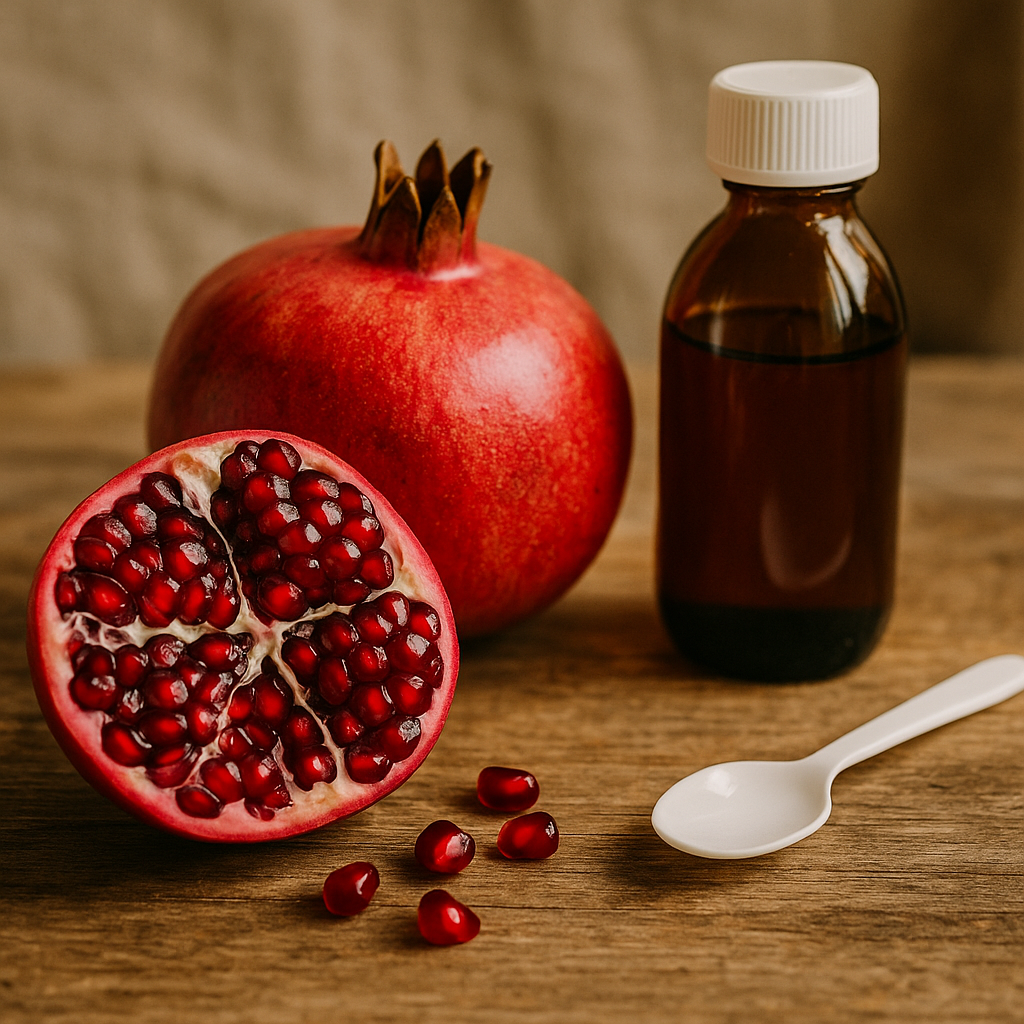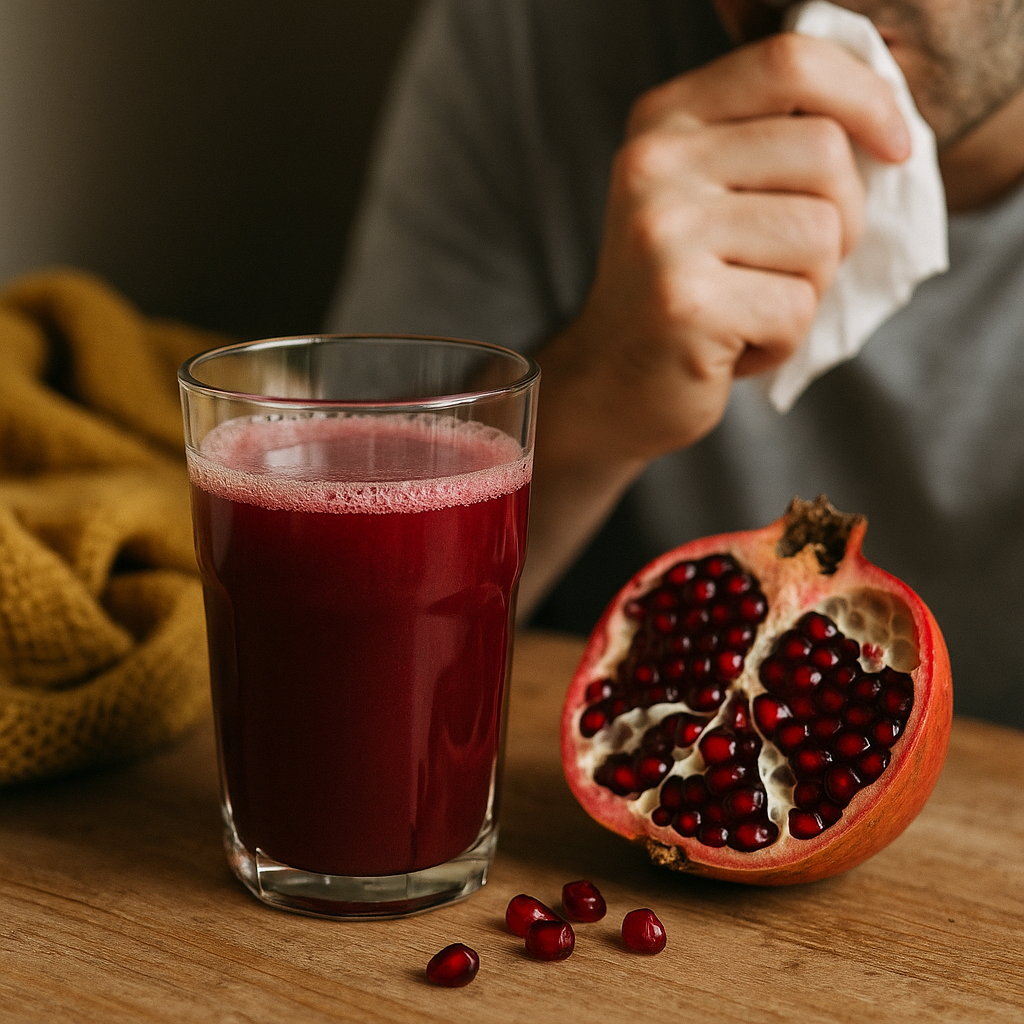Is Pomegranate Good for Cough? Ayurvedic Benefits and Usage

If you’ve ever wondered is pomegranate good for cough, you’re not alone. This bright red fruit has been praised in ancient healing traditions like Ayurveda for its cooling, soothing, and immune-supportive qualities. In fact, many home remedies across the world use pomegranate for cough, sore throat, or even mild fever. But does it actually work, and is there real science behind it — or is it just another old wives’ tale?
Before we dive in, here’s the simple truth: pomegranate is good for cough in many cases, but not always in the way people think. Ayurveda describes it as a “tridoshic” fruit, which means it can balance all three doshas (Vata, Pitta, Kapha) when used correctly. For people struggling with seasonal colds, that’s a big deal.
Still, like any natural remedy, it’s not a magic bullet. If you have a severe infection or high fever, please see a doctor first. Remedies like pomegranate in cough can be helpful, but they’re part of a bigger approach to healing.

Ayurvedic Explanation: Why Is Pomegranate Good for Cough and Cold?
Pomegranate in Cough According to Ayurveda: Dosha Balance and Healing
Ayurveda, India’s ancient wellness system, classifies food and herbs based on how they affect the body’s energy systems — the doshas. Cough and cold are usually linked with an imbalance in Kapha (too much mucus, heaviness) or sometimes Pitta (inflammation, sore throat).
Pomegranate, known as Dadima in Sanskrit, is said to be light, astringent, and cooling. These qualities help pacify both Kapha and Pitta, making it especially useful for pomegranate during cough conditions. Its juice is mildly sweet but also slightly tangy, which stimulates digestion while calming throat irritation.
Some Ayurvedic practitioners suggest mixing fresh pomegranate juice with a pinch of black pepper and honey. This isn’t just for taste — it’s believed to balance the fruit’s cooling nature while boosting its cough-relieving effects. Of course, tastes differ and some folks don’t enjoy the tang that much (my cousin, for one, can’t stand it!).
How Pomegranate Helps in Cold, Cough, and Sore Throat Relief
The astringent properties of pomegranate help “tighten” and tone mucous membranes, reducing excessive phlegm production. This is why pomegranate in cough home remedies have been passed down for centuries.
Its natural antioxidants, like punicalagins and vitamin C, can help reduce inflammation in the throat. If you’ve ever had a cold where swallowing feels like sandpaper — you know how valuable that is.
Also, pomegranate has mild antimicrobial effects. In Ayurveda, this is explained as it “cleansing” the throat and blood. Modern science might just say: it helps fight certain bacteria and viruses. Either way, when you sip pomegranate juice for cough, it’s not just a comfort drink — it’s actively supporting your immune response.

Don't wait or self medicate. Start chat with Doctor NOW
Health Benefits of Pomegranate During Cough and Fever
Pomegranate Is Good for Cough: Cooling and Anti-inflammatory Action
When fever joins the party with a cough, things get miserable fast. Many people ask: is pomegranate good for cough and fever? The answer is often yes — especially if the fever isn’t extremely high. Its cooling nature helps reduce body heat while still giving you antioxidants and hydration.
For example, during a mild flu, some people find that chilled (but not ice-cold) pomegranate juice in cold and cough situations makes them feel refreshed and less irritable. Ayurveda warns against icy drinks during illness, so room temperature juice is usually best.
Plus, its anti-inflammatory compounds can soothe a burning throat and reduce swelling in the tonsils. That’s why pomegranate benefits for cough go beyond just symptom relief — they also address some of the root causes of discomfort.
Using Pomegranate Juice for Cough: Methods and Cautions
How to Use Pomegranate Juice for Cough and Cold Relief
Fresh is best. If you’re going to try pomegranate juice for cough, aim for juice made from ripe, fresh fruits rather than bottled versions loaded with sugar or preservatives. In Ayurveda, freshness isn’t just about taste — it’s about keeping the prana (life energy) intact.
One of the simplest ways to use it:
-
De-seed a medium pomegranate.
-
Blend or press the seeds to extract the juice.
-
Drink it at room temperature, ideally mid-morning or afternoon.
For extra relief, some people stir in a teaspoon of honey (unless you have a high fever — then skip honey for now) and a pinch of black pepper. This combo balances the fruit’s cooling nature with a gentle warming action, which is particularly good for pomegranate during cough cases where mucus feels heavy.
You could also try gargling diluted pomegranate juice if your throat feels raw. It sounds odd, but the astringent compounds can tone throat tissues and reduce swelling.
Can We Drink Pomegranate Juice During Cough and Fever Safely?
Many folks wonder, can we drink pomegranate juice during cough and fever? Generally yes, but moderation is key. The fruit is cooling, so in Ayurveda it’s perfect for hot, inflamed conditions — but not if your body already feels cold or weak.
If your cough is due to dryness (Vata imbalance), too much cooling food might worsen the tickle in your throat. In such cases, warm herbal teas may be better, with a small glass of juice only once a day.
Another thing: don’t overdo it. Three glasses a day won’t heal you faster — it might upset your stomach or cause loose motions. Nature’s medicine works best in small, regular amounts, not megadoses.

Side Effects and When to Avoid Pomegranate During Cough
While pomegranate is good for cough in most people, there are some exceptions.
-
If you have chronic low blood pressure, excessive juice intake could make you feel dizzy.
-
Those with sensitive digestion or diarrhea should limit intake — pomegranate’s astringency can aggravate certain gut issues.
-
If you’re allergic (rare, but it happens), avoid it entirely during illness.
Ayurveda also advises avoiding pomegranate immediately after consuming dairy, as the combination can be heavy on the stomach and produce ama (toxins).
Also — and this is important — if you’ve been coughing for more than 2 weeks or have high fever, shortness of breath, or chest pain, skip the home remedies and go straight to a doctor. Pomegranate won’t replace antibiotics or antiviral meds when they’re truly needed.
Conclusion
So, is pomegranate good for cough? In most mild cases, yes — especially when used thoughtfully and in line with Ayurvedic principles. It offers cooling relief, helps reduce throat inflammation, and supports the immune system without the side effects of harsh medicines. But like any remedy, it works best when part of a balanced approach that includes rest, hydration, and, if needed, medical care.
Whether you sip pomegranate juice in cold and cough or use the seeds in a warm salad, remember to listen to your body. Healing isn’t just about what you eat — it’s also about how you live while recovering.
FAQs
1. Is pomegranate good for treating cough and cold naturally?
Yes, in many mild to moderate cases, pomegranate for cough can be helpful. Its cooling, anti-inflammatory, and astringent qualities soothe the throat, reduce mucus, and support immunity. Ayurveda has used it for centuries in this way. Just remember — it’s not a cure-all. If your symptoms worsen, get medical advice.
2. Can we drink pomegranate juice at night during cough?
You can, but it’s better to drink it earlier in the day. Cold or heavy foods late at night can sometimes slow digestion, especially when you’re unwell. If you really want it at night, have it at room temperature, and don’t mix with heavy meals.
3. Is pomegranate good for cough and fever at the same time?
For fevers accompanied by sore throat and inflammation, pomegranate is good for cough and fever relief because it helps cool the body and keeps you hydrated. However, if your fever is very high or you have chills, balance the cooling effect with something warming, like ginger tea during the day.
4. What are the benefits of drinking pomegranate juice for cold and cough?
The key pomegranate benefits for cough include:
-
Reducing throat inflammation.
-
Cutting down excessive phlegm.
-
Providing vitamin C and antioxidants to boost recovery.
-
Helping maintain hydration without overly sweet or artificial drinks.
And let’s be honest — it’s delicious, so it’s easier to keep sipping.
5. Is pomegranate during cough suitable for children?
Yes, but keep portions small — maybe ¼ cup of fresh juice once a day for kids over two years old. Avoid very chilled juice and skip adding strong spices. Always check for allergies before giving it to a child.
Final Thoughts
The answer to is pomegranate good for cold and cough isn’t just a yes or no. It’s a yes — if you use it mindfully, choose fresh juice, and pair it with other healthy recovery practices. Ayurveda’s wisdom aligns surprisingly well with modern nutrition science here: pomegranate’s unique mix of antioxidants, natural sugars, and tannins makes it more than just a pretty fruit.
If you found this guide useful, share it with a friend or family member who’s battling a cough. Sometimes the simplest remedies are the ones we overlook. And if you’ve got your own twist on a pomegranate in cough recipe, post it online — your tip might be exactly what someone else needs.
Got any more questions?
Ask Ayurvedic doctor a question and get a consultation online on the problem of your concern in a free or paid mode.
More than 2,000 experienced doctors work and wait for your questions on our site and help users to solve their health problems every day.

